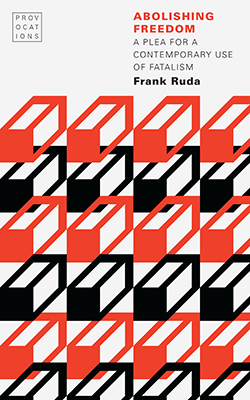
The End
| By Alenka Zupančič |
| Issue 1 | October 31, 2016 |
One way to address some of the important issues at stake in Frank Ruda’s book Abolishing Freedom would be to ask the question of the relationship between repetition and ending. Repetition is a vast and complex philosophical notion; it is also one of the “four fundamental concepts of psychoanalysis,” as the title of Lacan’s famous seminar suggests. The topics of the end (of many things, such as art and history, as well as even more radical apocalyptic expectations, including that of a “total extinction”) also have heavily charged philosophical (and psychoanalytic) resonances. In view of this, our little attempt here to speak of their relationship—and to speak of it in a rather anecdotic way—cannot but come across as comedic. So be it. The text that follows is not a commentary on Ruda’s book. It is more like a light philosophical side dish to Ruda’s work, connecting and dialoging with some of its conclusions especially concerning the end of repetition and the repetition of the end. It is a sign of a great text when one gets all kinds of (further) ideas while reading it. What follows is an exposition of some of the ideas I got from reading Ruda’s book.
But Wait—It Gets Worse
| By Andrew Cutrofello |
| Issue 1 | January 30, 2017 |
Fatalistic readers of Frank Ruda’s 2011 book Hegel’s Rabble knew that it was only a matter of time before Donald Trump would be elected President of the United States. As Ruda explained, the modern Hegelian state produced its own grave-diggers—not in the form of a revolutionary proletariat, but in the form of a politically disaffected, economically idle rabble. It was Marx’s contribution to philosophy to see the practical necessity of transforming Hegel’s rabble into a revolutionary proletariat. The difficulty of completing this transformation—the difficulty of passing from Hegel to Marx—was due (at least in part) to the fact that the rabble consisted not only of the disaffected idle poor but of the disaffected idle rich. Mobilizing the rich rabble to counter the revolutionary tendencies of the poor rabble was the Hegelian state’s best defense against its own dissolution. The only question for a fatalist resigned to expect the worst was whether it would be Donald Trump or some other representative of the rich rabble who would succeed in rechanneling the revolutionary tendencies of the poor rabble. In the inverted world of counterrevolutionary politics, it is no wonder that Steve Bannon, Trump’s alt-right-hand man, has called himself a Leninist.
Geohistorical Materialism
| By Mark Pingree |
| Issue 1 | February 21, 2017 |
There’s a certain irony, or comedy if you like, in the realization that the philosopher of history has ended up so comprehensively on the wrong side of history. Taking into account the many ways Hegel has been discredited leads Frank Ruda to admit that, surely, Hegel must be the worst philosopher. Rather than regard this as a weakness, however, Ruda’s opening gambit is to take this worst-ness seriously not by reading Hegel as a teleological thinker advocating for the status quo, but as an apocalyptic fatalist, a thinker of the end of all things. The philosophy of history is not a tale of progressive unfolding but a tale of inevitable decay and inexorable worsening. The mere existence of philosophy as such indicates that the worst has always already happened. Philosophy, in other words, is not destruction, but destruction thinking itself—a reactive and intrinsic endeavor to think the end.
Dialectics of Determinism
| By Andrew Pendakis |
| Issue 1 | July 11, 2017 |
The metaphysics of the shopper owes a secret debt to Hobbes. Like Kant, Hobbes espoused a metaphysics of freedom that was compatibilist. Unlike Kant, he was able to balance consistent scientific materialism with the requirements of freedom, not by positing the existence of a spontaneously free will, but by re-defining liberty negatively as the absence of “externall impediments” to voluntary action. The will, then, is determined, but an is action free if it is allowed to proceed unhindered toward its desired end. Today, nothing in the unconstrained stroll of the browser is threatened by the specter of hidden, determinist necessity.
I’m a Fatalist, But Not By Choice
| By Aaron Schuster |
| Issue 1 | September 11, 2017 |
It is almost impossible today not to be a consumer of the apocalypse, whether in films, novels, magazines, or TV series, or simply on the daily news. Against the multiple visions of the end on offer, one can only hope that, to cite the superb French slogan, itself an ironic updating of the utopian spirit of May ’68, une autre fin du monde est possible, “another end of the world is possible.” In the spirit of this graffiti, and against all odds, Frank Ruda proposes in Abolishing Freedom a comic fatalism. Turning around the mass market doom scenarios, his “good news” is that the worst has already happened: this is the central thesis of the book, and it is meant to jar.
From Catastrophic Messianism to Comic Fatalism: A Reply to my Critics
| By Frank Ruda |
| Issue 1 | September 25, 2020 |
The present texts will address some of the intricate issues that were raised in response to Abolishing Freedom. Unfortunately, the reader has to suffer through a rather longish introductory detour that will set the stage and provide the whole discussion with some additional gun powder. This gun powder production will be realized by recourse to a position that allows me to articulate the precise contours of the fatalist position that I defend in a more nuanced manner. I foresee this won’t end well and will introduce problems that will be far worse for me than the ones I tried to solve. But, well, what else could have been expected. Worstward, ho!
